Wondering how to write a strong MBA Letter of Recommendation for your business school application?
This guide has everything you need for writing your Letter of Recommendation (LoR) quickly and powerfully.
Here’s a quick preview of what you’ll read ahead –
Why Does A MBA Letter Of Recommendation Matter for Your MBA Application
Who Should Be Your Recommender
Who Should You NOT Have As Your Recommenders
5 Things To Look For When Choosing Your Recommenders
List Of Important Documents To Keep Handy Before Writing Your LoRs
2 Common MBA Letter of Recommendation Templates
How To Answer Each MBA Letter of Recommendation Question (With Examples)
Alrighty, let’s get started!
MBA Letter of Recommendation – Generally, an afterthought
Most applicants work hard to get a great GMAT score.
Next, they spend weeks, if not months, polishing up their essays and resume.
As for the MBA Letter of Recommendation?
Unfortunately, that’s given the least priority, which means they end up submitting an LoR that doesn’t paint a strong picture of the impactful work they’ve done or of their leadership potential.
Can a MBA Letter of Recommendation make or break your application?
Absolutely. That’s why it’s all the more important to understand the “Why” behind an MBA Letter of Recommendation.
So, why does a MBA Letter of Recommendation matter?
Take a step back and look at your application. From your resume to your essays – these are all about you, by you, talking about what a great fit you are for your target business school.
An LoR, on the other hand, gives AdComs a chance to hear it from another credible source, your recommender, someone who has supervised your work, seen you in action (hint: leadership mode), and mentored and coached you.
An LoR helps AdComs see, through the eyes of another individual who knows you well — not only how you deal with success but also how you respond to feedback and work on overcoming your weaknesses.
Effectively, your LoR is the X-Factor AdComs consider when deciding between two equally strong applications.
Meaning, it can be a deal breaker in your quest for getting admission to your target business school.
That’s why view your LoR as another opportunity to market your candidacy to the AdComs.
Writing your MBA Letter of Recommendation – A Challenge That’s An Opportunity in Disguise
That’s because you can use your LoR to –
Validate your achievements
When your recommender enthusiastically attests to the achievements you have written about in your application, s/he is doubling down on the key aspects you have mentioned in your application, lending credence to your candidacy.
Include new experience(s)
Your recommender can highlight additional leadership or managerial experiences that you haven’t covered in your resume or essays, either because you ran out of space or because the context didn’t require it.
Bring in a fresh or unique perspective
Your recommender could have a unique way of perceiving your key attributes, skills, and your work, and an LoR is a great way for them to share that.
Neutralize Perceived Weakness(es)
Say, if you have a liberal arts background, your recommender can mention how effectively you use your quantitative skills for your daily work or have demonstrated it on a specific project.
Similarly, if you have a quant-focused work profile or you are in an Individual Contributor (IC) role, your recommender can highlight your strong communication and collaboration skills.
Choosing Wisely – Who Should Be Your Recommender?
Context Matters
Depending on whether you are employed in a company or self-employed, your choice of recommenders could vary.
Another important consideration is whether you are a recent graduate with less than 2 years of work experience or a more seasoned professional who has worked for more than 2 years.
Both factors would play an important role in selecting the right recommender(s).
Now, most business schools have between 1 – 2 recommendation letters. So, given the above factors, choose the best option that fits your context
- Recent graduate (0-2 years of work experience) | Employed in a firm | Up to 2 Recommendation Letters Needed
- It’s best to choose your current manager as your primary recommender.
- Your second recommender could be a faculty member who has taught you or who has had a chance to see you in action, leading college fests or excelling in academics, summer projects, and so on.
- If you’ve volunteered with a social organization, you could’ve one of its senior members be your second recommender as well.
- Alternatively, if you have a senior mentor at work, someone who has worked with you, and has given you constructive feedback, then s/he would also be a good choice as a second recommender.
- Experienced Professional (2+ years of work experience) | Employed in a firm | Up to 2 Recommendation Letters Needed
- Choose your current manager as your primary recommender.
- If you work in a matrixed environment, choose your direct and functional managers as your primary recommenders
- In case, you aren’t comfortable getting recommendations from either of them but share a great rapport with their managers, go the skip-level route and choose your super managers as your recommenders.
- You could also consider a senior mentor at work, someone who has closely observed your performance and has given you constructive feedback.
- If you have volunteered with a social organization, you could have one of the senior members of that organization be your second recommender as well.
- Self-Employed | Up to 2 Recommendation Letters Needed
- You could ask your clients, suppliers, partners, or board members to be your recommenders.
- You could also ask senior members of any social organization you are affiliated with as a volunteer to be your recommenders as well.
- And if you have recently graduated and are on great terms with your college professors or deans, you could have them as your recommenders too.
In case you chose an ex-colleague to be your recommender, make sure it’s someone you worked with recently, that is not more than 2 years ago. As you’ll see later, recency — how recently has your recommender worked with you — is another important factor.
Who should you NOT have as your recommenders?
Your peers, friends, and family members should never be your recommenders.
A good rule to remember when it comes to choosing your recommenders should be that it’s someone who is in a senior position to you and
- assigns or delegates work to you,
- is responsible for observing your performance,
- knows about your finest and most recent achievements at work, and
- has the authority to share feedback, good or bad, without any threat of retaliation.
Therefore, it’s highly recommended you get your managers to be your recommenders.
But what if you are unable to get your managers or direct supervisors to be your recommenders?
If you know your managers won’t approve of your plans to do a full-time MBA, then it’s fine to choose recommenders other than your direct supervisors.
Just make sure you use the optional essay section to describe your reasons for choosing recommender(s) other than your current managers or supervisors.
5 Things to look for when zeroing in on the right person to be your recommender
1. Does your recommender like you?
Everything goes for a toss if your recommender doesn’t really like you or if you feel that your recommender may have more negative than positive things to say about you.
Your recommender should be someone who is a big champion of yours and genuinely wants you to succeed because that would show in the way they write about you.
I’ve had instances of clients who weren’t always entirely sure whether their recommenders would wholeheartedly endorse them in their LoRs.
If you find yourself in a similar situation, my advice is to trust your gut instinct and find another recommender who would gladly write a fine recommendation for you.
2. Do they know you and your work well?
Your recommender should know the work you’ve done, the impact you’ve created, and who has seen you in leadership mode at work.
Essentially, your recommender should be able to corroborate all that you’ve mentioned as your significant achievements in your application.
Not only that, but your recommender should also be able to share a unique perspective on your strengths, attributes, and how you’ve evolved in your career since the time they’ve known you.
3. How long have they known you?
This brings us to the next logical question – how long and how recently has your recommender known and worked with you?
If they’ve only worked with you for a short amount of time or many years ago, then their recommendations may not be considered as powerful as someone who has observed you at work in the present or in the recent past.
Recency is a powerful factor AdComs consider when evaluating your LoRs.
That’s why it’s highly advisable to have current managers as your recommenders.
4. Is your recommender an alum of the school you are applying to? Or does s/he have an MBA from one of the premier business schools?
Nothing better than an alum endorsing a future student to the AdCom!
This would be a “good to have” because it’s not always possible to have recommenders who are also from the school you are applying to.
Another thing you could consider is, depending on the schools you are applying for, you could have different recommenders who are also alums of the respective schools.
Again, this is a “good to have” scenario and often uncommon. But if you find yourself in the enviable position of getting strong recommenders who also happen to have done their MBAs from your target schools, then go for it!
5. How open are they to ideas and suggestions from you?
It’s highly possible your recommender mayn’t remember all the stupendous work you’ve done working with them. Even if they do remember, it gets better when they are fine with you recapping your top 3-5 achievements that they could elaborate on when writing the LoR.
Therefore, having a recommender who is comfortable getting inputs from you about some of the work you especially want them to highlight, would go a long way in ensuring your recommendation letters are coherent with the rest of your application, such as your resume and essays.
Best time to reach out to your recommenders
Ideally, factor in at least 2-6 weeks for your recommender to write your LoR.
However, it’s possible to get your LoR done even within a week provided your recommender knows what to write.
Nevertheless, it’s a good idea to get started early with your LoR to avoid last-minute challenges such as recommenders struggling to submit LoRs due to technical issues or unforeseen circumstances.
Be Ready to Pivot In Case of Unforeseen Challenges Such As…
Your recommender backing out at the last moment
This can be one of the worst nightmares you could have in your application journey, but it can happen.
Identify 1-2 individuals who can step in as your recommenders in case your primary recommender, for reasons best known to her or him, decides to back out at the last minute.
This way you’ll not be left in a lurch wondering what to do next.
Now that you’ve identified the right recommender or two, it’s time to get into the LoR writing action mode.
Keep this list ready before you or your recommenders start writing your MBA Letter of Recommendation
After you’ve identified and roped in your recommenders, the next step is brief them, briefly of course, on what they should include or emphasize in the LoRs by sharing the below set of documents or information –
- Copy of your resume
- Copy of your essays
- Highlights of your most significant achievements at work – while it’s good to choose the ones that reinforce what you’ve mentioned in your essays and resume, make sure to include additional achievements not mentioned in your essays but that, nevertheless, clearly emphasize your professional and personal strengths
- Experiences where you created impact outside of your projects (such as CSR involvement, team bonding activities, and more)
- Appraisal assessment documents from your performance appraisal
- Deadline for LoR submission
Pro Tip – Whether your recommender writes the LoR, or you do it on behalf of your recommender, reference the above list when writing your LoR to ensure consistency with the rest of your application.
Writing your MBA Letter of Recommendation
Basically, there are 2 LoR templates with most schools opting for either of the two.
2 LoR Templates
- The Common Letter of Recommendation
- School-specific Letter of Recommendation
The Common MBA Letter of Recommendation
Released by GMAC (Graduate Management Admission Council), the common LoR template was created in collaboration with some of the leading business schools with a simple goal – to help recommenders and applicants save time by answering one common set of questions.
This means you and your recommenders get more time to craft a quality LoR rather than expending effort responding to different questions for different schools.
Schools Using the Common Letter of Recommendation (LoR) Form
- Asia School of Business – in collaboration with MIT Sloan Management
- Boston College – Carroll School of Management
- Boston University – Questrom School of Business
- Brandeis International Business School
- Carnegie Melon – Tepper School of Business
- College of William & Mary – Mason School of Business
- Cornell University – SC Johnson School of Business
- Dartmouth University – Tuck School of Business
- Duke University – The Fuqua School of Business
- Emory University – Goizueta Business School
- Fudan University – School of Management
- Georgetown University – McDonough School of Business
- Georgia Tech Scheller College of Business
- Indian School of Business
- MIT Management Sloan School
- New York University – Stern School of Business
- Northeastern University, D’Amore-McKim’s School of Business
- Notre Dame – Mendoza School of Business
- PennState University – SMEAL College of Business
- RICE University Jones Graduate School of Business
- Sabanci University – Sabanci School of Management
- Santa Clara University – Leavey School of Business
- Simon Fraser University, Beedie School of Business
- Stanford Graduate School of Business
- Southern Methodist University – Cox School of Business
- The College of New Jersey
- The University of Texas at Austin – McCombs School of Business
- UC Davis Graduate School of Management
- UCI Paul Merage School of Business
- UCLA Anderson School of Management
- UNC Kenan-Flagler Business School
- University of Florida – Warrington College of Business
- University of Georgia – Terry College of Business
- University of Kansas School of Business
- University of Michigan – Ross School of Business
- University of Minnesota – Carlson School of Management
- University of Rochester – Simon Business School
- University of San Francisco – School of Management
- University of Virginia – Darden School of Business
- Vanderbilt – Owen Graduate School of Management
- Washington University in St. Louis – Olin Business School
- Yale School of Management
As new schools keep adopting the common LoR format, the above list will continue to grow.
To find out whether your target school has adopted a common LoR form, check the updated list here – https://www.gmac.com/reach-and-recruit-students/prepare-candidates-for-the-exam-classroom/common-letter-of-recommendation-lor
The Common LoR is divided into 3 sections
Section 1: Personal Information About the Recommender
Section 2: Leadership Assessment Grid
The grid is comprised of 12 competencies and character traits that contribute to successful leadership. The competencies and character traits are grouped into five categories:
- Achievement
- Influence
- People
- Personal Qualities
- Cognitive Abilities
Section 3: Recommendation Questions (Open-ended Questions for Recommenders)
- Please provide a brief description of your interaction with the applicant and, if applicable, the applicant’s role in your organization. Up to 50 words
- How does the performance of the applicant compare to that of other well-qualified individuals in similar roles? (e.g., what are the applicant’s principal strengths?) Up to 500 words
- Describe the most important piece of constructive feedback you have given the applicant. Please detail the circumstances and the applicant’s response. Up to 500 words
- Is there anything else we should know? (Optional)
While sections 1 and 2 are simple and straightforward, section 3 is the part that forms the bulk of your LoR.
So, let’s see how we can tackle each of the 4 questions in section 3
How to Answer Each of the 4 LoR Questions
Please provide a brief description of your interaction with the applicant and, if applicable, the applicant’s role in your organization. Up to 50 words
With a stringent word limit of 50 words, make sure you respond to both parts of this question –
1) how the recommender interacts with the applicant, and
2) the applicant’s role within the recommender’s organization. Here’s a sample response we coached one of our clients on –
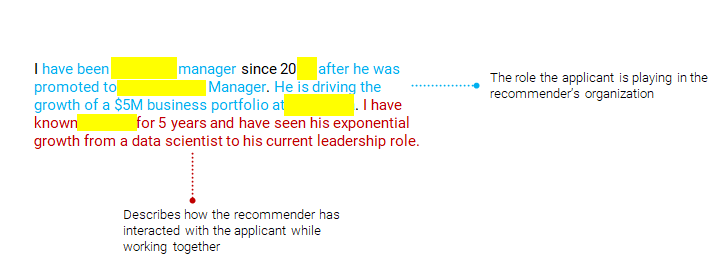
See how we have addressed each part of the question.
Also, observe how the recommender is giving a concise yet powerful overview of the strong career progression of the applicant, setting the stage for a compelling recommendation letter.
How does the performance of the applicant compare to that of other well-qualified individuals in similar roles? (e.g., what are the applicant’s principal strengths?) Up to 500 words
Many applicants directly launch into examples but it’s always good to start with the context.
And how do you do that? By outlining the strengths that make you, the applicant, stand out vis-à-vis your peers or colleagues.
The rest of the response can then elaborate on each of your strengths through specific examples as well as your recommender’s observations, showing how you’ve used those strengths to differentiate yourself at work.
Continuing with our example, here’s an excerpt from the original response –
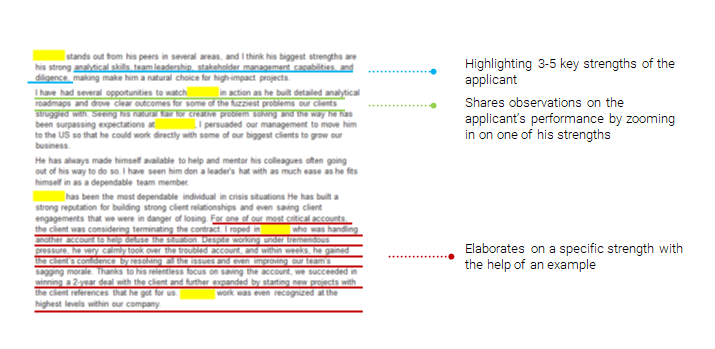
Notice how you could write this response by choosing which strength to elaborate on by using either a specific example or an observation.
This strategy will help you answer your question as clearly as possible (without going overboard with numerous examples or staying superficial with general observations) while still staying within the word limit of 500 words.
Remember if your recommenders were to actually write your LoR, they’ll also choose to be optimal with their words, given their busy schedules, while being objective in their assessment of you and your work.
Describe the most important piece of constructive feedback you have given the applicant. Please detail the circumstances and the applicant’s response. Up to 500 words
Through this question, AdComs want to know not just any weakness you may have but also how well you respond to advice on overcoming your weaknesses and do so, by taking clear actions.
Therefore, here are 3 things you need to know when building your response –
- You should not only capture your recommender’s feedback but also share how you’ve acted on the feedback and made good progress in your area of improvement.
- When it comes to identifying the right weakness, make sure it’s related to your work and not to some personality trait. For instance, instead of writing about how your recommender advised you to be calmer or more patient, focus on how s/he advised you to improve in an area related to work.
- Zoom in on an area of improvement where you’ve made some good progress.
In case, you want to include more than one piece of feedback, remember to include at most two pieces of feedback. Importantly, keep both examples short and to the point.
For instance, when one of our clients wanted to include two pieces of feedback, we helped them craft a response that showed how both feedback helped them build stronger professional capabilities –
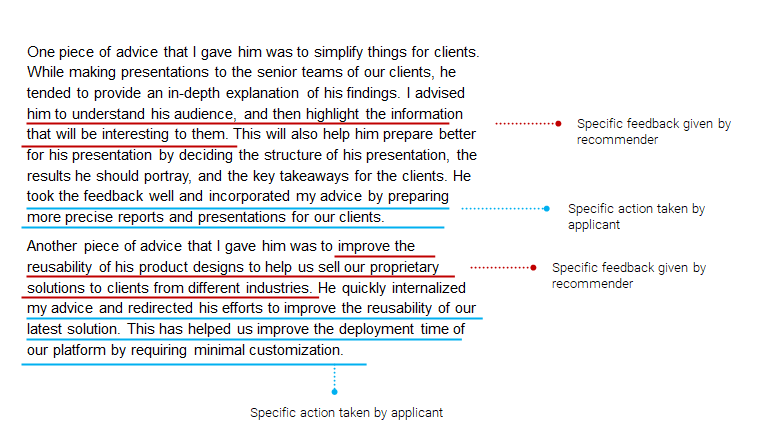
Is there anything else we should know? (Optional)
Though this question is optional, respond to this question if
- you want to add something that hasn’t been covered in the preceding set of questions, or
- there’s something you would like to reiterate or reinforce from other parts of your application.
For instance, if you are planning to go on a sabbatical from your current company to pursue your MBA, you can mention it in this essay to show AdComs that your recommender is supportive of your MBA plans.
For instance, one of our clients chose to reiterate how strongly his recommender, who was also his current manager, views his leadership potential and endorses his plan to grow within his current organization –
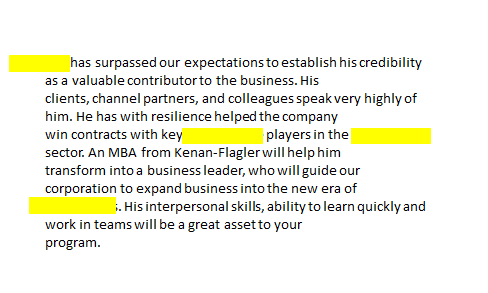
Final Piece of Advice
To reiterate – while it’s advisable to get your LoRs written by your recommenders, real-life constraints might require you to write your LoRs on behalf of your recommenders.
Be aware of 2 major pitfalls with this approach –
First is, that you might either lose your objectivity when writing your LoRs, sounding unnaturally enthusiastic.
And the second is, that you may feel you are bragging and therefore, self-censor your writing.
Both these cases will only cause red flags in the AdComs’ minds.
One way to avoid these pitfalls when writing your LoRs would be to request 20-30 mins of your recommenders’ time and get them to share their thoughts on the LoR questions. You could capture it in writing or over a call, transcribing it later. This way you capture not only their thoughts but also the way they would have written your LoR.
And writing the way we speak (or, in this case, the way your recommenders speak) would help you draft more genuine-looking LoRs that look and read differently from your own style of writing.
Use the tips and strategies from this post and find your LoRs shaping up as compelling and authentic narratives of your professional and personal trajectories.
Need help with your MBA essays, MBA Letter of Recommendation, resume, or interview preparation? Work with MBAEssayNation and stride your way to the top of the business school admit lists
With MBAEssayNation, craft compelling essays, and resume and submit a strong application, boosting your chances of getting an admit to your preferred business school.
Here’s what some of our clients share about their experience working with MBAEssayNation –

“I was ecstatic when I got an admit from USC Marshall and that too with $70,000 in scholarships. MBAEssayNation helped me prepare a strong application and coached me thoroughly for my interview. When I approached MBAEssayNation, I knew my biggest weakness was that I wasn’t good at writing powerful stories about the work I had done so far. My post MBA goals were also a big mess, I was quite confused about what I wanted to do post MBA. Deepthi coached me on my essays and the way she edited my essays, the outcome was fantastic. We must have had at least 15 essay reviews and edits – Deepthi was clear that we’ll work on my essays till they turn out to be the best. And that’s another thing I loved about MBAEssayNation, their unlimited reviews and laser focus on quality. The reviews and edits were so totally worth everything because my final essays were crisp, and they sharply and succinctly conveyed my stories. Simply put, I couldn’t have made it to USC Marshall without the exceptional coaching by MBAEssayNation.“

One of the main things I decided to work with Deepthi is that she is an extremely straightforward person who doesn’t hesitate to share honest feedback about your admit chances or about the various parts of your application. This is something I didn’t anywhere else – most admission consultants will try to lure you by saying you have a strong chance or try to direct you to programs that aren’t a good fit for you, or as in my case, being an older MBA applicant, many admission consultants didn’t want to work with me because they didn’t think I had a shot at getting into the schools I was targeting. During our initial conversations, she told me clearly that as an older applicant to full time MBA programs, my chances of getting an admit might be less but what she could assure was that we’d submit the best applications to the schools I was targeting. And that’s exactly what happened. I got admits from all the schools I had applied to. I took Deepthi’s help for applying to Emory and NUS, and both the schools accepted me with Emory giving me a 50% tuition fee waiver as scholarship. Deepthi expertly turned my lengthy essay drafts into the most compelling essays, she just knows what stories will grab the attention of the AdCom. Without her help, I would have taken months to write my essays. Deepthi would just send me flawless essays within days – felt like magic! Besides the sharply written essays by Deepthi, she coached me splendidly for the video essays to both these schools. I remember for my video essays, I was struggling to identify the right stories and within minutes, Deepthi had already shortlisted and told me the ones I should focus on for my video essays, she’s just that superb with a brilliant eye for detail. I give 100% credit to Deepthi for the enormous success I gained with my business school admits.

Thanks to Deepthi, I got admits from all my 3 dream schools this year – The Indian School of Business (ISB), NUS Business School (NUS) and Nanyang Business School. I would like to conclude by saying this – Deepthi is THE best MBA admissions consultant in India. She’s truly an awesome coach and mentor, who is even more invested in her clients’ success than her clients! That’s really incredible and literally unheard of in this space. That’s why I believe Deepthi and her company MBAEssayNation is a beacon of hope in a space like MBA admissions consulting where most companies are only interested in making money rather than helping their clients succeed. Work with Deepthi and MBAEssayNation if you want the finest essays, resume and the best interview preparation – the seamless experience that you get with MBAEssayNation and the high Return on Investment you achieve thanks to Deepthi’s mentoring is the best value for money.

I worked with Deepthi on my ISB business school application and though I reached out to her with just a week before the submission deadlines, she was extremely patient in coaching me with my essays and was always available for a quick call. In fact without her help, I couldn’t have come up with strong post MBA goals. She has a strong industry background which she used to help me to gain more clarity about how my post MBA goals should be structured. All my essays looked brilliant thanks to her and MBAEssayNation. MBAEssayNation is the ONLY reason why I got admits from ISB, Michigan Ross and INSEAD. Highly recommended!

Deepthi, Founder of MBAEssayNation understood my application really well. So, starting from how I started from my education to the essays, to the resumes, the entire life cycle was taken into consideration before she started coaching me on application. It was thanks to her coaching I didn’t have to worry about thinking or writing about anything extraneous on my application, because everything had been thought through well, had been researched, and had been debated before it was decided and became part of my application, be it my essays, resume or my interview responses. I am so grateful to Deepthi for helping me get admits to most of the schools I applied to from Kenan Flagler, Ivey School of Business, NUS, Vanderbilt, to Tepper School of Business. I was ecstatic about how seamless the process was thanks to Deepthi, she is an amazing mentor. I have finally decided to go to my most coveted school the Tepper School of Business and I highly recommend Deepthi and MBAEssayNation.
Ready to get started with MBAEssayNation?
Connect with MBAEssayNation to get started with your Business School Application
Email us on letsgetstarted@mbaessaynation.com or call us on +91 9901875008 and let us help you submit a stellar application.

Our highly personalized client experience combined with our 97% success record means we amplify your chances of getting admits to your dream MBA programs.



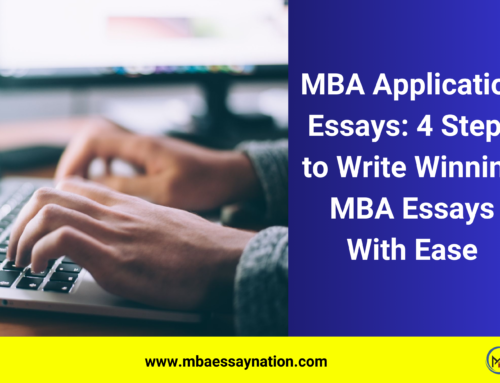


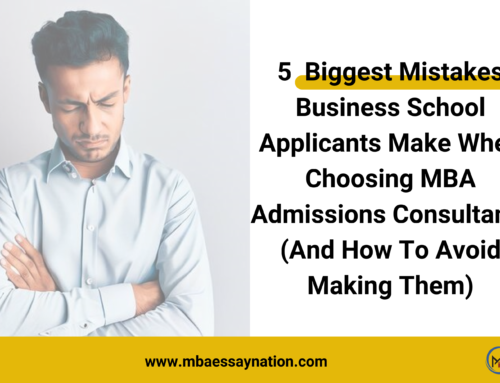
![CMU Tepper MBA Essays for 2022-2023 – Essay Questions, Tips, and Deadlines [With Sample Essays Inside]](https://mbaessaynation.com/wp-content/uploads/2022/09/MBAEssayNation-Blog-Post-Header-Image-4-500x383.png)